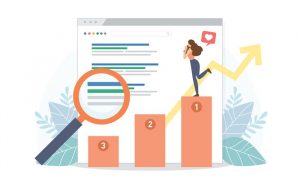THE BENEFITS OF GOOGLE RANKING
Without a doubt, Google controls the majority of the search engine market. Bing and Yahoo are constantly increasing their market share, and having Apple’s search engine default on all of their devices might be disastrous. Whatever the case may be in the future, Google ranking is currently the most important for businesses, since the search engine behemoth owns 70% of the market.
With 3.5 billion search queries every day, ranking for terms related to your business could result in a significant increase in website traffic. With the rise of search engines like YouTube, Facebook, Amazon, and others, how crucial is it to rank in Google for SEO?

STATISTICS FOR RANKING ON THE FIRST PAGE OF GOOGLE
Over the last few years, numerous studies have produced a range of figures addressing the impact of Google ranking, including:
Non-branded searches vs. branded searches
Searches with or without ads (ads above and/or beside the results)
Desktop vs. mobile
Searches for long-tail keywords
When a user conducts a search, approximately 90% of clicks are directed to organic search results, with the remaining 10% directed to pay-per-click adverts above or beside organic results. While PPC advertisements are still crucial in an integrated marketing approach, ranking organically gives you control over those places and allows you to obtain more traffic.
The majority of users browse past the adverts to see organic search results, according to this Mediative heat map.
Similarly, around 91 percent of Google traffic comes from the first page, whereas only 4% of visitors click through to the second page of results, 1% to the third page, and then it drops down into fractions of a percent.
HOW DO I GET A GOOGLE KEYWORD RANKING?
Without getting into too much detail about the complete process that an SEO service may handle, here are some high-level actions you can perform yourself to help your site rank.
Improve your website's performance.
Experts have estimated that Google uses more than 200 ranking parameters. It gets even more complicated when you consider that some of those ranking indicators can have up to 50 different permutations, according to Matt Cutts of Google.
As a result, a content- and data-driven strategy that builds authority links and engages a social audience is one of the greatest digital tactics.
Your website also need stronger copy and a strong customer journey, because consumers may leave your site and return to the search results, where your competitors are. If your bounce rate is high, which means someone visits a page and then departs without visiting another, you should check to see if your website is making any common website blunders that are contributing to the high bounce rate.
Remember that the more high-quality content pages you have on your website, the better your chances of ranking. It will be considerably more difficult to steal visitors from your competitors that have a larger online presence if you have a smaller website with only 10-20 pages.
Begin creating useful content.
With a useful blog, you can easily add more relevant pages to your website by assisting your visitors in finding a solution. We’ve already discussed the advantages of blogging for business, but in short, it helps you build your brand and authority, earns trust in your industry, allows you to engage socially by sharing your content across social media networks, and improves your long-tail rankings, which will drive more traffic – all of which will hopefully travel through your funnel and generate conversions.
Long-form writing, which is typically 1,000-3,000 words, is the best style of blogging. As you can see in this graph, the average content length ranking on the first page of organic results is at least 2,000-2,500 words.
When you generate long-form content, whether it’s an ultimate guide to a service in your sector or a how-to instructional piece that walks someone through an issue, you can start attracting links in your industry through outreach, content, and social media promotion. With these authoritative and industry-relevant links, those content pieces will begin to rank higher, resulting in more organic traffic.
This method can be used by looking at the material your competitors have been producing and creating something considerably better and more valuable. Then you can look up who has linked to and mentioned them for their content and contact them for a link.
eBooks, whitepapers, case studies, influencer interviews, films, infographics, slideshows, and other forms of content could be created in addition to blogging.
When it comes down to it, optimising your website and obtaining links, mentions, and shares from your sector are the most important variables in ranking. There are numerous precise tactics you can employ in order to improve your online ranking.

